| Srl | Item |
| 1 |
ID:
131737
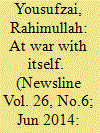

|
|
|
| 2 |
ID:
046639
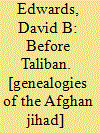

|
|
|
|
|
| Publication |
Berkeley, University of California Press, 2002.
|
| Description |
xxii, 354p.: ill., mapspbk
|
| Standard Number |
0520228618
|
|
|
|
|
|
|
|
|
|
|
|
Copies: C:1/I:0,R:0,Q:0
Circulation
| Accession# | Call# | Current Location | Status | Policy | Location |
| 045981 | 958.1045/EDW 045981 | Main | On Shelf | General | |
|
|
|
|
| 3 |
ID:
188337
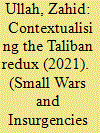

|
|
|
|
|
| Summary/Abstract |
After the Taliban takeover of Afghanistan, a Pakistan spy chief told journalists in Kabul: ‘don’t worry, everything will be okay’ in Afghanistan. What is interesting to note in this assertion is that Pakistan had consistently been accused of playing a ‘double game’ in the war on terror since 2001. This paper examines the return of the Taliban and Pakistan’s role in their victory in August-2021. In particular, it addresses the following questions: Why are Pakistan-Afghanistan relations so fraught? What is the pattern of Pakistan’s influence over the Afghan Taliban? How different is the post- 2021 Taliban regime from its Taliban predecessors (1996–2001)? What might the long-term implications of the Taliban victory be for Pakistan? This paper employs the security-cum-rentier state framework to explain Pakistan’s double game in the war on terror. Moreover, this paper aims to situate and contextualize the situation in Afghanistan (2001–2021) in the ongoing geopolitical rivalry, i.e. Quad/ Indo-Pacific Strategy (West) versus the Belt and Road Initiative (China). Methodologically, this study is based on secondary sources and some primary sources (official documents).
|
|
|
|
|
|
|
|
|
|
|
|
|
|
|
|
| 4 |
ID:
113502
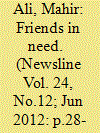

|
|
|
| 5 |
ID:
109504
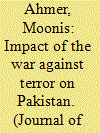

|
|
|
| 6 |
ID:
178158
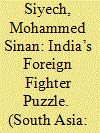

|
|
|
|
|
| Summary/Abstract |
Since its rise in 2014, Islamic State (IS) has attracted more than 30,000 volunteers to take part in the conflicts raging in Syria and Iraq. Despite a large presence of more than 160 million Muslims in India, not more than a hundred people have travelled abroad to join IS. This article attempts to explain the low participation of Indian Muslims in foreign conflicts. Drawing on existing literature and interviews with academics, government officials and members of the Muslim community across India, this article demonstrates that insurgency movements such as the Afghan Jihad in the 1980s, Indian government actions, and other factors such as logistical issues, family structure, ideological opposition and racism in IS ranks have collectively played a role in preventing Indians from taking part in the Syrian and Iraqi conflicts. This article is valuable given the low level of literature pertaining to Indian Muslims and their absence from the global jihadist community.
|
|
|
|
|
|
|
|
|
|
|
|
|
|
|
|
| 7 |
ID:
129383
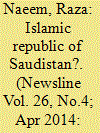

|
|
|
| 8 |
ID:
188810
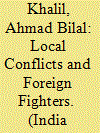

|
|
|
|
|
| Summary/Abstract |
The emergence of the Afghan Arabs phenomena is the by-product of the Afghan ‘jihad’. The Arabs that mostly came to Afghanistan sought to fulfil a ‘religious’ duty in the form of jihad. This migration process from the Arab countries to the Af-Pak region was in line with the USA, Pakistan, Afghan mujahideen, Arab countries’ policies and volunteering fighters’ personal beliefs.
The Afghan Arabs were not a homogeneous group; they were ideologically and strategically fragmented and had different groups and views. Hence, all Afghan Arabs did not end up in Al-Qaeda. Despite this fragmentation, Afghan Arabs played an essential role in the Afghan conflict, from raising funds to providing volunteer fighters and coverage of ‘jihad’ through their media sources. They also intervened in the affairs of Afghan mujahideen groups. They either sided with the opposing jihadi factions (and later with the Taliban) during the Afghan Civil War or remained silent. In the post-2001 period, their role was limited to technical support and fighting against the ‘common enemy’. In this period, the Taliban’s policy towards Al-Qaeda was to not condemn, not cut ties, to regularise them while officially rejecting their presence.
|
|
|
|
|
|
|
|
|
|
|
|
|
|
|
|
| 9 |
ID:
145898
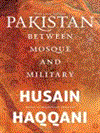

|
|
|
|
|
| Publication |
Gurgaon, Penguin Books India Pvt. Ltd., 2016.
|
| Description |
xv, 462p.hbk
|
| Standard Number |
9780670088560
|
|
|
|
|
|
|
|
|
|
|
|
Copies: C:1/I:0,R:0,Q:0
Circulation
| Accession# | Call# | Current Location | Status | Policy | Location |
| 058707 | 322.509549/HAQ 058707 | Main | On Shelf | General | |
|
|
|
|